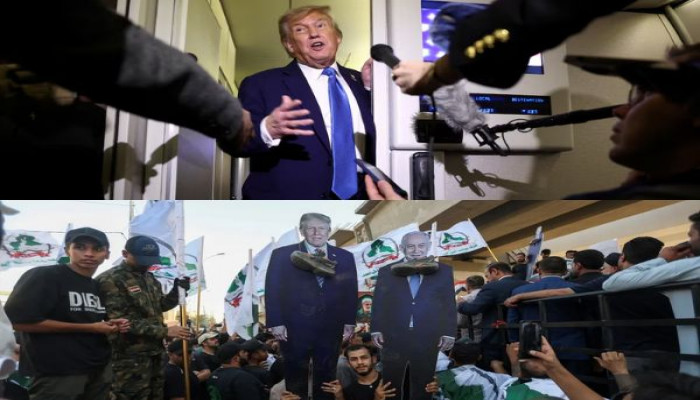Trump says seeking 'real end' to end Israel-Iran war; Iran's top Iranian commander killed in Israeli air strikes
- In Reports
- 06:15 PM, Jun 17, 2025
- Myind Staff
U.S. President Donald Trump expressed that he sought a "real end" to the nuclear conflict with Iran. He signalled that he could send high-ranking American officials to hold negotiations with the Islamic Republic. Meanwhile, the Israel-Iran air war raged on for a fifth day.
Israeli Defence Minister Israel Katz warned that Iran's Supreme Leader, Ayatollah Ali Khamenei, could face the same fate as Iraqi President Saddam Hussein. The U.S. had overthrown Hussein in an invasion and subsequently hanged him following a trial.
Katz told top Israeli military officials, "I warn the Iranian dictator against continuing to commit war crimes and fire missiles at Israeli citizens." Later, Iran's state media reported that people in Tehran heard an explosion.
Trump spoke to reporters following his departure from Canada, where he spent Monday at the Group of Seven nations summit. He predicted that Israel would not ease its attacks against Iran. "You're going to find out over the next two days. You're going to find out. Nobody's slowed up so far," he said.
Trump said he might send U.S. Middle East Envoy Steve Witkoff or Vice President JD Vance to meet with Iran. Washington said Trump continued to pursue a nuclear agreement with Iran despite escalating military tensions.
Trump left the summit early because of the situation in the Middle East. He said his early departure had "nothing to do with" working on a deal between Israel and Iran. French President Emmanuel Macron said the U.S. had initiated a ceasefire proposal. Trump stated that something "much bigger" than that was expected. He wrote this on his Truth Social platform late Monday.
Israeli air strikes had already killed several of Khamenei’s top military and security advisers. These losses created major holes in his inner circle. Five people familiar with his decision-making said this raised the risk of strategic errors. One of those sources, who regularly attended meetings with Khamenei, described the risk of miscalculation for Iran on issues of defence and internal stability as "extremely dangerous."
Israel’s military said Iran’s military leadership was "on the run." They said they had killed Iran's wartime chief of staff Ali Shadmani overnight. Shadmani had held the role for just four days after replacing another commander killed in the strikes. Ali Shadmani, Iran’s wartime Chief of Staff, was killed in an Israeli airstrike in Tehran, the Israeli Defence Forces confirmed on Tuesday.
Khamenei, who was imprisoned before the 1979 revolution and maimed by a bomb attack before becoming leader in 1989, remained deeply committed to Iran’s Islamic system. He remained deeply mistrustful of the West.
Iran's Revolutionary Guards said they had hit Israel's Military Intelligence Directorate and Mossad's operational centre early Tuesday. There was no Israeli confirmation of such attacks.
Israel launched air raids with a surprise attack, which killed nearly the entire top echelon of Iran’s military commanders and its leading nuclear scientists. Israel said it now had control of Iranian airspace. It said it intended to escalate the campaign in the coming days.
Trump consistently said the Israeli assault could end quickly if Iran agreed to U.S. demands that it accept strict curbs on its nuclear programme.
On Tuesday, Iran's Revolutionary Guards said they had launched a "more powerful" new wave of missiles towards Israel. The state news agency reported the update. A senior Iranian army commander said a new wave of drones would hit Israel.
Iran's Nournews reported that an Israeli attack killed three people and injured four in Iran’s central city of Kashan. Iranian media reported explosions and air defence fire. They reported that Iranian doctors and nurses had been recalled from leave to carry out their duties.
World oil markets remained on high alert, closely monitoring developments that could hit global supply. Two oil tankers collided and caught fire Tuesday near the Strait of Hormuz. The collision happened as electronic interference increased during the Iran-Israel conflict. There were no injuries to crew members and no oil spillage.
Naval sources told Reuters that electronic interference with commercial ship navigation had increased in recent days around Hormuz and the wider Gulf. This interference affected vessel operations.
Qatar's foreign ministry spokesman said Israel’s "uncalculated" targeting of Iran’s South Pars gas field, the world's biggest, which Iran shares with Qatar, raised concerns for "everyone" about supplies. A fire broke out at the gas field after a strike on Saturday and temporarily suspended production. The spokesman said production was steady.
An Israeli military official said Iran had so far fired 400 ballistic missiles and hundreds of drones towards Israel. Iranian officials reported 224 deaths, mostly civilians. Israel reported Iranian attacks had killed 24 civilians. Israeli Finance Minister Bezalel Smotrich said nearly 3,000 Israelis had been evacuated due to damage from Iranian strikes.
Israel's military said Iranian attacks had killed 24 people and injured more than 647. They said 35 missiles had penetrated the defence shield and made direct hits.
Iranian Foreign Minister Abbas Araqchi said on X, "If President Trump is genuine about diplomacy and interested in stopping this war, next steps are consequential." He said, "Israel must halt its aggression, and absent a total cessation of military aggression against us, our responses will continue."
Iran denied seeking nuclear weapons. Iran pointed to its right to nuclear technology for peaceful purposes, including enrichment, as a party to the Nuclear Non-Proliferation Treaty.
Israel, which is not a party to the NPT, is the only country in the Middle East widely believed to have nuclear weapons. Israel does not deny or confirm that.







Comments